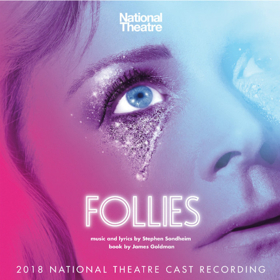CD Review: FOLLIES, 2018 National Theatre Cast Recording

The National Theatre's Follies (currently enjoying a well-deserved encore run) is something of a musical theatre miracle. Stephen Sondheim and James Goldman's 1971 show has endured almost as much existential angst as its characters, endlessly chopped and changed, but Dominic Cooke's production - appropriately enough - succeeds by both taking a new tack, and by going back to the beginning.
The creators' original vision is captured in its full glory, with Weismann's former showgirls reuniting in their derelict theatre while their ghostly counterparts haunt its crumbling walls. But the show's themes reach far beyond backstage drama, Cooke's incisive, coherent version ensuring that even the pastiche numbers convey ideas about ageing, nostalgia, decision-making, fantasy, love, and self-image.
The meticulous care of the National's production is continued in the cast recording, demonstrating the collaborative brilliance of orchestrations from Jonathan Tunick and Josh Clayton, music supervision from Nicholas Skilbeck, and musical direction from Nigel Lilley - the latter conducting an exceptionally expressive 21-piece orchestra.
Described by Sondheim as an "orgy of pastiche", his Follies songs are love letters to composers and lyricists past, and the gorgeously vivid orchestrations help lend real specificity to each one. Setting the tone is "Beautiful Girls", a take-off of Irving Berlin's Ziegeld Follies theme song. Led by the soaring vocals of Bruce Graham's Roscoe, it's stately and majestic in its build, evoking a bygone age.
Di Botcher finds both irony and indefatigable spirit in "Broadway Baby", lifted aloft by vibrant accompaniment, while Tracie Bennett's "I'm Still Here" segues powerfully from wry anecdotes in front of a crowd to a solo roar of survival - in which the fantastic brass section seems to cry out with her. And, for a change of a pace, there's Josephine Barstow and Alison Langer's "One More Kiss" - the Franz Lehar-esque operetta that almost transcends pastiche in so heavenly a rendition.
But it's not just the big spotlight numbers that impress here. There are wonderful details throughout, picking up Sondheim's layered lyrics and atonal warning signs as his central quartet begins to unravel. Follies may not be plot-driven, but its psychological drama is gripping - and the score is an intrinsic part of that.
Imelda Staunton communicates Sally's ambivalence and barely controlled distress in the delicate "In Buddy's Eyes", building to a brutally raw "Losing My Mind" - almost rough in parts, as she tears the mask off. In contrast, Philip Quast's vocals are mellifluous, but heartbreakingly inflected with Ben's growing despair; Fred Astaire-esque surface perfection undone by emotional truth.
Though you lose the incredible vaudevillian physicality, hearing Peter Forbes's "Buddy's Blues" in isolation highlights the cleverness of his choices: the way that Buddy's strength and shrewdness are increasingly apparent in the bitterly delivered lyrics and powerful vocals, yet he's aware of the irony that it's all for naught while he's in thrall to Sally.
And Janie Dee sets an intimidatingly high bar for all future incarnations of Phyllis with her pin-sharp delivery of the acidic one-liners and illuminating lyrics, culminating in paean to dissatisfaction "Could I Leave You?" - so devastating an assault that it would vanquish any opponent, except that it's clear in Dee's rendition the damage is also self-inflicted.
This Follies is quite simply sublime, and the cast album is not just a pleasure, but a vital - and equally sensational - record of a musical theatre triumph.
Warner Classics' Follies cast recording is now available for digital download and streaming. The CD will be released in April and is available for pre-order
Reader Reviews



